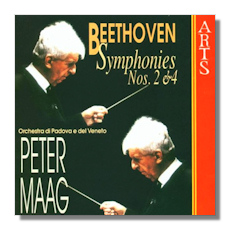
The Internet's Premier Classical Music Source
Related Links
- Beethoven Reviews
- Latest Reviews
- More Reviews
-
By Composer
-
Collections
DVD & Blu-ray
Books
Concert Reviews
Articles/Interviews
Software
Audio
Search Amazon
Recommended Links
Site News
 CD Review
CD Review
Ludwig van Beethoven

Symphonies, Volume 1
- Symphony #2 in D Major, Op. 36
- Symphony #4 in B Flat Major, Op. 60
Padova e del Veneto Orchestra/Peter Maag
Live concert performances 1994
Arts 47244-2
There is an unfortunate myth – especially in talking to young musicians – that great recordings only come from big name orchestras and labels. Neither statement is true, especially as one collects more music and spends time with great artists who never got much attention. Peter Maag is certainly one of those artists, a man who made some waves conducting Mozart and Mendelssohn for Decca before having an Indian summer on Arts recording the core of his repertoire. For younger collectors, he was his generation's Claus Peter Flor.
The music of Beethoven may seem an odd fit for the Padova e del Veneto Orchestra, and in some ways it is. The musicians are enthusiastic without ever rising to the level of more famous colleagues. As Peter Grahame Woolf noted in his 2004 review of the complete set (Arts 47370-2), the Venice forces are comparable to the number of musicians that Beethoven's orchestras would have had, yet Maag doesn't aim for a historically-informed approach. Also from that review are words like "naturalness", "rightness", and "perfectly satisfactory". Over a decade later, I can only concur with these words, which describe nearly all the late conductor's work. There is a near-ideal balance of drama and joy, while the Venice players give everything they have.
In these relatively neglected Beethoven works, all they have is more than enough. Technically, they require less than the Third, Seventh, or Ninth. More importantly, they fit both the abilities of ensemble and conductor very well. Maag's abilities as a Mozart conductor are displayed by his deep understanding of the Classical elegance these pieces require. Rather than underplaying them – a common mistake – the conductor brings the same commitment that he brought to the lesser symphonies of Mendelssohn. And just like that project, the results are excellent. Sure, the Venetians aren't the New York Philharmonic Orchestra, but listen to how much more lovingly they phrase their parts than in Leonard Bernstein's admirable but rather rough and ready 60's versions. Mind you, Bernstein's two Beethoven cycles are both excellent and worth hearing, but there is something about the unpolished yet supremely articulated performances here that will likely win over the collector tired of hearing beautiful sounds devoid of passion. It worked for me, and could very well work for you.
Copyright © 2015, Brian Wigman





















